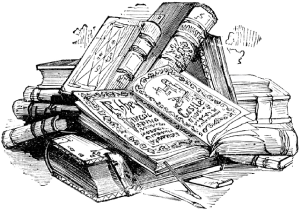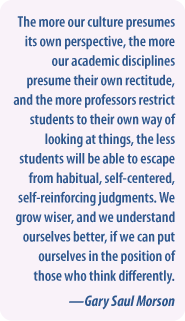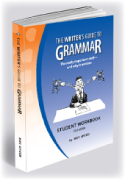|
newsletter — July 3, 2015
How literature is now taught in college
—and why enrollment in literature courses is in steep decline
by Roy Speed
 This month Commentary magazine published an important article by a professor of Russian literature at Northwestern University. At bottom, this article is about the benefits of literature studies for students of every discipline — STEM, the humanities, social sciences, you name it — and those benefits are fundamentally about developing character. This month Commentary magazine published an important article by a professor of Russian literature at Northwestern University. At bottom, this article is about the benefits of literature studies for students of every discipline — STEM, the humanities, social sciences, you name it — and those benefits are fundamentally about developing character.
The article articulates two things vital for us home educators to understand:
- In college, literature is being taught badly. It's being taught in ways that drain all pleasure from the experience and extinguish students' interest in further literature studies.
- Literature's unique benefits are being squandered. This article lays out the precise nature of the value students derive from studying literature (when it's well taught, of course) — value that is gained through no other area of study — and shows how that value is being ignored in favor of trivial pursuits or political agendas.
The Commentary article is called "Why College Kids Are Avoiding the Study of Literature," and it's by Gary Saul Morson. I can't do it justice here — I recommend reading it in its entirety. What I'll do here is summarize some of the most important points and give you a sense of Morson's writing.
Bad teaching
When Professor Morson asks students why they're not taking more literature courses, "[they] respond by describing some literature course they took that left them thinking they had nothing to gain from repeating the experience." — Put more bluntly, the classes suck, and they're expensive, so why bother?
It's worth noting that Morson himself does not have this problem. For more than a decade, he's been teaching the largest class at Northwestern, with enrollment of around 500 students. And those large numbers are not because his course is a core requirement — he teaches in the Department of Slavic Languages and Literatures, and the course is about Russian novels. No, what's filling his seats is word of mouth — which suggests that low enrollment is due not to any lack of interest in literature among students, but rather to their revulsion toward college courses in the subject.
Morson proceeds to catalog the atrocities that other literature professors routinely inflict on their students. In the process, he explains how these practices snuff out students' interest in literature:
- The technical approach. “The teacher dedicates himself to the book as a piece of craft. Who is the protagonist, and who is the antagonist? Is there foreshadowing? Above all, this approach directs students to look for symbols... [It] involves teaching a dense thicket of theory focused on ‘the text’.”
- Death by judgment. “[The professor] faults or excuses author, character, or the society depicted according to the moral and social standards prevalent today, by which I mean those standards shared by professional interpreters of literature. These courses are really ways of inculcating those values and making students into good little detectors of deviant thoughts.”
- Treating works of literature as documentaries. For instance: “Dickens is notable [only] because he depicts the deplorable conditions of workers of his age.” Morson adds: “It has been orthodoxy among literature professors for some three decades that there is no such thing as ‘great literature.’ There are only things called great literature because hegemonic forces of oppression have mystified us into believing in objective greatness, whereas intrinsically Shakespeare is no different from a laundry list or any other document.”
To reinforce the last point, Morson quotes a standard work, The Norton Anthology of Theory and Criticism:
Literary texts, like other artworks, are neither more nor less important than any other cultural artifact or practice. Keeping the emphasis on how cultural meanings are produced, circulated, and consumed, the investigator will focus on art or literature insofar as such works connect with broader social factors, not because they possess some intrinsic interest or special aesthetic values.
The value of studying literature
Professor Morson poses the following question — and then provides about as good an answer as I've ever seen: "Is there something one can learn from literature [that] one cannot learn just as well or better elsewhere?"
Morson believes — as do I — that one of the benefits unique to the study of literature is lessons in empathy:
Many disciplines can teach that we ought to empathize with others. But these disciplines do not involve actual practice in empathy. Great literature does, and in that respect its study remains unique among university-taught subjects.
When you read a great novel, you put yourself in the place of the hero or heroine, feel her difficulties from within, regret her bad choices. Momentarily, they become your bad choices. You wince, you suffer, you have to put the book down for a while. When Anna Karenina does the wrong thing, you may see what is wrong and yet recognize that you might well have made the same mistake. And so, page by page, you constantly verify the old maxim: There but for the grace of God go I. No set of doctrines is as important for ethical behavior as that direct sensation of being in the other person's place.
Again, we are often told how important it is to empathize, but Morson describes how “only literature offers constant practice in doing so”:
It is really quite remarkable what happens when reading a great novel: By identifying with a character, you learn from within what it feels like to be someone else. The great realist novelists, from Jane Austen on, developed a technique for letting readers eavesdrop on the very process of a character's thoughts and feelings as they are experienced. Readers watch heroes and heroines in the never-ending process of justifying themselves, deceiving themselves, arguing with themselves. That is something you cannot watch in real life, where we see others only from the outside and have to infer inner states from their behavior. But we live with Anna Karenina from within for hundreds of pages, and so we get the feel of what it is to be her. And we also learn what it is like to be each of the people with whom she interacts. In a quarrel, we experience from within what each person is perceiving and thinking. How misunderstandings or unintentional insults happen becomes clear. This is a form of novelistic wisdom taught by nothing else quite so well.
What Morson is describing is study and lecture devoted to the interior landscape of human experience — a landscape on which the typical high-school-age student turns a completely untrained eye.
 The study of literature is unique in affording opportunities to explore the realm of human relationships and interactions in a completely safe environment. In my own series on Romeo & Juliet, for instance, we note that Romeo is in love with being in love, with almost no awareness of what love really means. Juliet, by contrast, speaks of the manipulations and games teenagers are drawn to — like playing hard-to-get — and expresses her own preference for directness and honesty. She says to Romeo: The study of literature is unique in affording opportunities to explore the realm of human relationships and interactions in a completely safe environment. In my own series on Romeo & Juliet, for instance, we note that Romeo is in love with being in love, with almost no awareness of what love really means. Juliet, by contrast, speaks of the manipulations and games teenagers are drawn to — like playing hard-to-get — and expresses her own preference for directness and honesty. She says to Romeo:
… if thou think'st I am too quickly won,
I'll frown and be perverse, and say thee nay
So thou wilt woo—but else, not for the world.
The characters in Shakespeare's plays often put into words their deepest fears and most ardent wishes. They debate — often with themselves — the morality or wisdom of what they're doing/about to do/considering doing. A regular event in Shakespeare is introspection, a practice we home educators must introduce to our students, along with qualities like humility, self-honesty, and the ability to question our own motives, beliefs, or ideas.
(Let's remember, too, that our teens face headwinds quite different from those of our own youth. Social media and the various forms of instant communication do not favor introspection, subtle insight, careful reasoning, or self-honesty, but rather their opposites: superficiality, impulsive remarks, feelings over reason.)
Back to Morson, and what it means to develop one's capacity for empathy:
Reading a novel, you experience the perceptions, values, and quandaries of a person from another epoch, society, religion, social class, culture, gender, or personality type. Those broad categories turn out to be insufficient, precisely because they are general and experienced by each person differently; and we learn not only the general but also what it is to be a different specific person. By practice, we learn what it is like to perceive, experience, and evaluate the world in various ways. This is the very opposite of measuring people in terms of our values.
What Morson is describing is an area of study in which students can develop wisdom and deepen their own character.
Teaching well
I've quoted Professor Morson at great length, and still I haven't covered everything worth reading in this article — for instance, Morson describes a number of practices he considers key to teaching literature well. Most important, Morson is unusually articulate about what has become ideologically anathema to most professors: great literature, and the role it can play in helping our students become fully rounded, insightful, sensitive, and tolerant human beings.
In a future blog, I'll present my own views on what it looks like to teach literature well.
Not on our mailing list? — Adding yourself is easy; just go here.
|
|
|
View all our online courses here.
Eight weeks, in depth, live & online
Twice weekly sessions for two semesters
Twice weekly sessions for two semesters
- March 7, 2020: Beyond the Tour: Getting the most from your college visits
- July 29, 2019: Advocating for oneself, Part 2: College admissions essays & interviews
- May 29, 2019: What our students aren't taught about grammar
- May 16, 2017: Advocating for oneself (Part 1 of 2)
- July 20, 2016: The development of adolescent minds
- December 24, 2015: The appeal of videogames—and the hazards they bring
- August 16, 2015: Three skills your student needs to develop before college (Part 1 of 3)
- July 3, 2015: How literature is now taught in college—and why enrollment in literature courses is in steep decline
- June 1, 2015: Teaching Shakespeare to your kids: What I've learned
- Dec 28, 2014: Extracurricular activities, Part 2
- July 27, 2014: Levels of annotation —
Annotating the text, Part 2
- July 15, 2014: Extracurricular activities, Part 1
- July 2, 2014: Teens need to be together… An innovative solution
- June 9, 2014: The college admissions racket — Getting things into perspective
- June 2, 2014: Building good study habits
— Annotating the text, Part 1
- April 8, 2014: Building good study habits
— Close reading
- March 18, 2014: Why all our students must study Shakespeare
- Feb 25, 2014: Standardized tests, Part 2
- Feb 18, 2014: Standardized tests, Part 1
- Feb 1, 2014: Advanced mathematics
|
|
Shakespeare Intensives
Close reading of Shakespeare
Ten online sessions of 90 minutes
Ten online sessions of 90 minutes
Seven online sessions of 90 minutes
An introduction to Shakespeare's comedy
Eight online sessions of 90 minutes
ONLINE: English Language Arts
— Now open for registration —
Weekly online class
in the essentials of English
 This two-semester course is taught by the author of The Writer's Guide to Grammar. It puts in place skills and knowledge foundational to the study of English and the mastery of clear writing. The weekly class is live and online, and students master all the most important principles of the English language — grammar, usage, punctuation, and more. This two-semester course is taught by the author of The Writer's Guide to Grammar. It puts in place skills and knowledge foundational to the study of English and the mastery of clear writing. The weekly class is live and online, and students master all the most important principles of the English language — grammar, usage, punctuation, and more.
Online Writing
Two semesters of online classes
Two classes per week
Online Literature
Two semesters of online instruction
Training for parents
Now an online series!
This program addresses the principal concerns parents have about homeschooling through high school — curriculum and credits, standardized tests, transcripts and record-keeping, the application process, pursuing scholarships, and more.
Terrific. Full of information. The materials were so thorough. I now have a plan of action. Also, this workshop is inclusive: No matter what type of homeschooler you are, you will understand better how to prepare your student for college and present him or her in the best light.
Mother of two
|
|
![]()